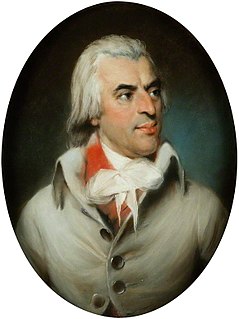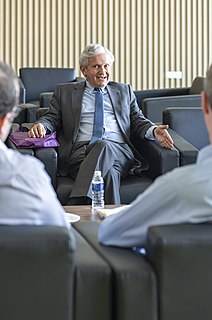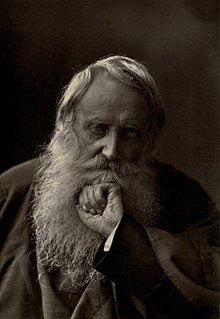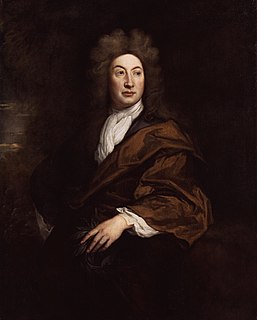
Arthur Young was an English agriculturist. Not himself successful as a farmer, he built on connections and activities as a publicist a substantial reputation as an expert on agricultural improvement. After the French Revolution of 1789, his views on its politics carried weight as an informed observer, and he became an important opponent of British reformers. Young is considered a major English writer on agriculture, although he is best known as a social and political observer. Also read widely were his Tour in Ireland (1780) and Travels in France (1792).

The Keeper or Master of the Rolls and Records of the Chancery of England, known as the Master of the Rolls, is the President of the Court of Appeal of England and Wales, Civil Division, and Head of Civil Justice. As a judge, he or she is the second in seniority in England and Wales only to the Lord Chief Justice. The position dates from at least 1286, although it is believed that the office probably existed earlier than that.

Sir Henry Taylor was an English dramatist and poet, Colonial Office official, and man of letters.

John Baker Holroyd, 1st Earl of Sheffield was an English politician who came from a Yorkshire family, a branch of which had settled in the Kingdom of Ireland.

The British Critic: A New Review was a quarterly publication, established in 1793 as a conservative and high-church review journal riding the tide of British reaction against the French Revolution. The headquarters was in London. The journal ended publication in 1843.

The Poet Laureate of the United Kingdom is an honorary position appointed by the monarch of the United Kingdom, currently on the advice of the prime minister. The role does not entail any specific duties, but there is an expectation that the holder will write verse for significant national occasions. The origins of the laureateship date back to 1616 when a pension was provided to Ben Jonson, but the first official holder of the position was John Dryden, appointed in 1668 by Charles II. On the death of Alfred Lord Tennyson, who held the post between November 1850 and October 1892, there was a break of four years as a mark of respect; Tennyson's laureate poems "Ode on the Death of the Duke of Wellington" and "The Charge of the Light Brigade" were particularly cherished by the Victorian public. Four poets, Philip Larkin, Thomas Gray, Samuel Rogers and Walter Scott, turned down the laureateship. The holder of the position as at 2021 is Simon Armitage who succeeded Carol Ann Duffy in May 2019.

The Lieutenant of the Tower of London serves directly under the Constable of the Tower. The office has been appointed at least since the 13th century. There were formerly many privileges, immunities and perquisites attached to the office. Like the Constable, the Lieutenant was usually appointed by letters patent, either for life or during the King's pleasure.
English county histories, in other words historical and topographical works concerned with individual ancient counties of England, were produced by antiquarians from the late 16th century onwards. The content was variable: most focused on recording the ownership of estates and the descent of lordships of manors, thus the genealogies of county families, heraldry and other antiquarian material. In the introduction to one typical early work of this style, The Antiquities of Warwickshire published in 1656, the author William Dugdale writes:
I offer unto you my noble countriemen, as the most proper persons to whom it can be presented wherein you will see very much of your worthy ancestors, to whose memory I have erected it as a monumentall pillar and to shew in what honour they lived in those flourishing ages past. In this kind, or not much different, have divers persons in forrein parts very learnedly written; some whereof I have noted in my preface: and I could wish that there were more that would adventure in the like manner for the rest of the counties of this nation, considering how acceptable those are, which others have already performed
The Monthly Mirror was an English literary periodical, published from 1795 to 1811, founded by Thomas Bellamy, and later jointly owned by Thomas Hill and John Litchfield. It was published by Vernor & Hood from the second half of 1798.

The General View series of county surveys was an initiative of the Board of Agriculture of Great Britain, of the early 1790s. Many of these works had second editions, in the 1810s.
Events from the year 1721 in Scotland.
The Evangelical Magazine was a monthly magazine published in London from 1793 to 1904, and aimed at Calvinist Christians. It was supported by evangelical members of the Church of England, and by nonconformists with similar beliefs. Its editorial line included a strong interest in missionary work.
The Aldrichian Chairs were professorial positions at the University of Oxford during the nineteenth century, endowed by George Oakley Aldrich. His will left the residue of his estate to Oxford, to found in equal parts three chairs. By the 1850s the funds amounted to over £12,000. The handling of the chairs, however, was not of free-standing professorships, and by the end of that decade the funds had been repurposed.








